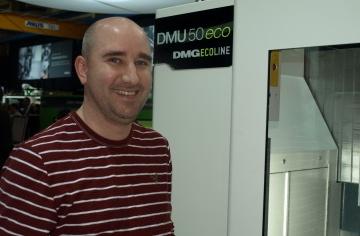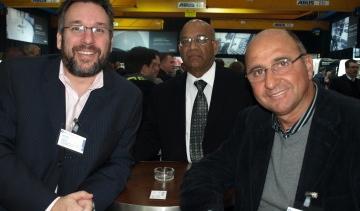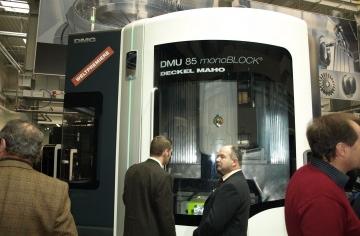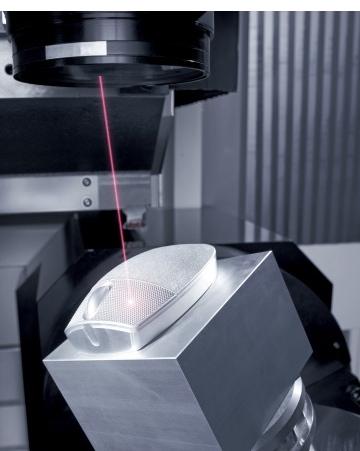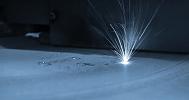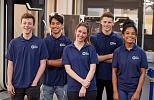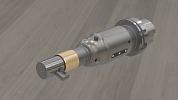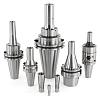- FMA
- The Fabricator
- FABTECH
- Canadian Metalworking
Searching for machine tools in Germany
Canadian manufacturers see first-hand how DMG machine tools are built at company open house in Pfronten, Germany
- February 7, 2011
- News Release
- Metalworking
Few companies in the world could pull off a successful one-exhibitor trade show, but DMG, Germany’s largest machine tool builder—and now one half of the giant DMG Mori Seiki company formed last year—did just that at its recent open house at its Pfronten, Germany manufacturing facility, held Feb. 1-5.
Nestled against snow-capped mountains in Southwestern Germany, the sprawling 800,000 sq ft manufacturing facility is the largest of three DMG operations in the country (the other two facilities are in Bielefeld and Seebach). This facility alone has the capacity to build 1,500 machine tools annually and a spindle department that delivers more than 2500 spindles a year to customers around the globe. The Pfronten site produces the MonoBlock, DuoBlock and Portal series, and horizontal machining centres.
Canadian Metalworking was invited as part the DMG Mori Seiki international press tour.
Thousands of attendees—4300 were invited—from around the world, including approximately 25 Canadian customers—came to see the 60-plus machines under power, learn more about how DMG manufacturers its machines—factory tours and technical presentations—and enjoy the sites and sounds of the region. This year, the annual event included four Mori Seiki machines—the NHX 4000 horizontal machining centre, the NVX 5080 vertical machining centre, the NLX 2500 MC/700 lathe and the NXL 2500 Y/600 multi-tasking machine—reflecting the new partnership between the two companies.
For Tim Boyer, vice president and plant manager for Battlefield International, based in Cayuga, ON, near Hamilton, ON, the trip to Germany was an eye opener.
“We don’t have DMG machines, but we were in the market for machines. The owner of the company saw the DMG Ecoline in a magazine. At the time we were looking or a five axis milling machine and the price of the Ecoline was reasonable.”
After considering the options, Battlefield, which manufactures fuel fittings for the aerospace market, decided it wasn’t ready for five axis milling.
“We’re not at that point in the company for five axis milling. We only have a couple of jobs we do on an existing milling machine, so now we’re leaning more towards buying a lathe or two and we’ll probably start with the Ecoline 310, priced at abut $100,000 to $120,000.”
Gas turbine manufacturer KK Precision Inc., Toronto, received its first DMG machine two weeks ago, a DMU 163 five axis milling machine.
“We know the DMG name and the reliability and performance of the machines, says Paul Dickinson, director of operations who, along with colleague and vice president George Koulakian was invited to DMG by DMG Canada sales and product manager Andy Maharaj. “And the support you get with the company when you buy the machine is outstanding.” KK Precision is looking for machine machines.
“We have expansion plans in the next two to five years and we’ll see how the DMG performs and we may purchase more machines,” adds Koulakian.
New Machines
DMG chose the event as a platform to debut several new machines. Of particular note were the world premieres of several machines, including one of DMG’s largest machine tools, “the mega milling centre XXL” DMU 600 P, featuring travel distances of 1,800 x 2,100 x 1,250 mm to 6,000 x 4,200 x 2000 mm and a high table load capacity of up to 40 t.
Laser texturing is not a new concept, but what is new is the ability to offer the process in a five axis universal milling machine. The DMU 2010 Shape allows for milling and laser operations on the same machine in a single setup. The process is well suited for making complex 3D moulds.
“In the automotive industry the trend is moving away from leather textures towards new technical structures. Similarily, PET bottle manufacturers express more complex needs, such as integrating 3D logos,” says Freidemann Lell, Sauer Lasertec sales manager at DMG.
Another new machine is the DMU 80 eVo, which integrates a universal milling machine with a vertical machining centre featuring a new NC swivel rotary table to support a broader range of applications. The new rotary table allows for undercuts up to 20º. Rapid traverse speed is 50 rpm for the B and C axes when tested with a load weight of 600 kg, making it suitable for five-sided machining.
Industry Outlook
During a press conference at the Pfronten facility, Dr. Rüdiger Kapitza, chairman of the executive board of Gildemeister, and Dr. Masahiko Mori, CEO of Mori Seiki, acknowledged the dramatic drop in the machine tool business in 2008, concurring the downturn has bottomed out and sales orders are rising.
“Our cooperation has helped us weather the crisis exceedingly well because [the partnership with Mori Seiki] helped us obtain work for our German workers because we sold in Asian markets and we’ve never had a foot in a country like Thailand before…this year we will sell as many Mori Seiki machines as Mori Seiki will sell for us. Each will sell one month’s production to the other one.”
Dr. Kapitza added he expects sales to increase by 20 per cent or more this year and next and reiterated DMG’s commitment to investing in a new facility being built in the US which will be dedicated to producing Mori Seiki (75 per cent) and DMG (25 per cent) machines.
Confirming the purchase of close to five acres (two hectares) of land in California, located close to Mori Seiki’s DTL (Digital Technology Laboratory) in Davis, CA, Dr. Mori said construction is slated to begin in May or June and completion is scheduled for February or March 2012.
“We will start with building 10 to 15 machines a month and after about six months we will increase machine tool production,” estimates Dr. Mori.
Responding to press questions about the merits of the DMG Mori Seiki partnership, Dr. Mori noted that by using the global production sites of each company, “we can shorten delivery times, cut down on transfer costs and hedge currency risks.”
subscribe now


Keep up to date with the latest news, events, and technology for all things metal from our pair of monthly magazines written specifically for Canadian manufacturers!
Start Your Free Subscription- Industry Events
MME Winnipeg
- April 30, 2024
- Winnipeg, ON Canada
CTMA Economic Uncertainty: Helping You Navigate Windsor Seminar
- April 30, 2024
- Windsor, ON Canada
CTMA Economic Uncertainty: Helping You Navigate Kitchener Seminar
- May 2, 2024
- Kitchener, ON Canada
Automate 2024
- May 6 - 9, 2024
- Chicago, IL
ANCA Open House
- May 7 - 8, 2024
- Wixom, MI













